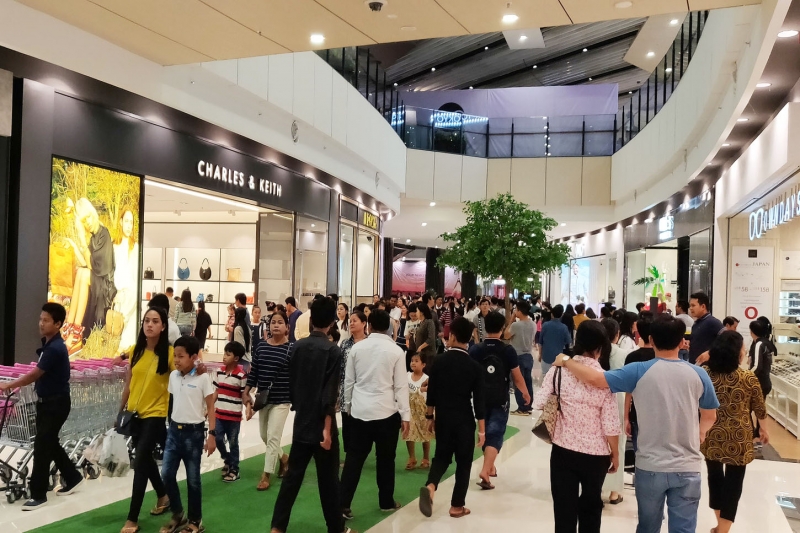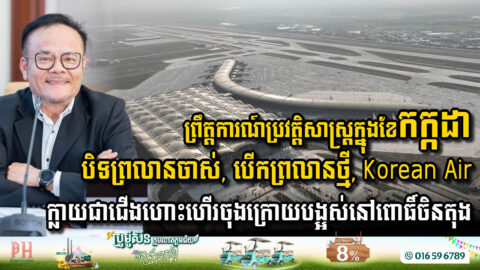Fast Fashion Retailers in Cambodia
Consumer optimism in Cambodia is high as the economy booms. More and more affordable international fashion brands are enteringthe market, and this brings more choices for the customers.Not only in Cambodia, but the fast fashion business model has revolutionised the apparel industry all over the world thanks to a good pricing strategy. Fast fashion retailers offer trends in the season that allow them to compete well in all the markets where they are located. In addition, consumer desire for fast fashion is not only based on low prices, but they are also willing to pay more for high-quality branded products.
In a developing country such as Cambodia, consumer spending has always consistently been a key growth driver of the economy. The rapid increase of the middle class in Cambodia makes the country a promising market for high-street fashion brands. Cambodia is the latest market where major retailers are focusing. It can be considered as an attractive market with the increasingly high-income consumers and rapid urbanisation, and the emerging middle class is likely to boost the overall retail market, particularly for fashion and clothing. Because of the middle-income bracket increases, the fast fashion retail market will offer vast opportunities for investors over the medium to long term.
Fast fashion’s ability to sell out products at very affordable prices is a strength to the retailer. Additionally, young people are quickly catching up to the newest international trends and this widens the product range and variety for the consumers, and they no longer need to travel to Bangkok, Hong Kong or Singapore for the latest styles, although these cities offer a broader selection of brands.
Many of the fast fashion brands existing in Phnom Penh offer fashionwear, as well as accessories, bags and shoes – all ready to wear products in the trendiest styles, at reasonable prices. Fashion brands such as Armani Exchange, Crocs, Dapperetc. entered the market in 2017. These fast fashion retail brands continue to enter the Cambodian market or increase their number of stores in Phnom Penh due to the strong retail market. In general, they have entered the market in the form of franchises, distribution deals or owning the stores. A number of these brands also introduced sister brands to locations where they already have a presence.
Most of the fast fashion retail consumers are between 15 and 40 years old. Meanwhile, over half of Cambodia’s population is under 35 years old. These middle-income consumers are looking for quality products with a pleasing design, sold at an affordable price.In the coming years, the market will continue to be led by mid-range fashion groups.
With the upcoming completion of new shopping centres in Phnom Penh, many more mid-priced and mass-market retailers are ready to explore the market. Brands such as Armani Exchange or Timberland haveboth recently made their own marks in Phnom Penh – this creates a big change for the clothing retail industry. Prior to the openings of Timberland, most of the well-known fast fashion brands existing in the market werefrom Malaysia or Thailand.
On the other hand, consumers perceive some of the fast fashion retailers as rather premium international brands and they aspire towards them. For example, UK shoe brand Clarks or French clothing company Lacoste. These brands have surprised the public because they offer a wide range of product items. Another reason why fast fashion brands are in the lead in Cambodia is because the country does not have a strong presence of local brands, unlike other countries where local brands make up a significant portion of apparel shares. In Malaysia, Thailand and Philippines for example, the local brands have been competing with these global fast fashion players but losing their market shares. Of course there are some local brands that continue to gain market share despite the entrance of various international fast fashion brands.
It is estimated that nearly 50 foreign fashion brands are present in Cambodia and holding the majority of the market share. Mid-tier brands such as Pedro or VNC are the most favoured in Cambodia. Foreign fashion brands have been flocking to Cambodia in recent years because they consider there to be plenty of opportunities, as the market which expects a high retail growth rate, is very lucrative in their eyes.
The entry of these internationally-recognised brands is seen to continue driving the absorption of retail space demand in Phnom Penh. The fast fashion segment usually accounts for approximately 30% of total retail spaces and I believe this will drive the retail space absorption in the upcoming shopping centres in Phnom Penh.
Currently the share of e-commerce is still quite small in terms of overall sales, but it is growing and there’s lot of innovation from this sector that traditional retailers may need to be aware of and I believe this will take a strong foothold in the market in the long term.Once the growth takes off, the market for e-commerce will be exponential.
In the long term, the fast fashion industry will become a big business. Brands that are more carefully designed in accordance with market demand and categories mix in advance will have the advantage in the market. Brands must spent time researching the country’s cultural, economic development and living conditions before they launch their designs in Cambodia – targeting the right consumer segments, market positioning, provide online retailing and social media are crucial aspects to stay successful in the market in the long run.
- Video Advertisement -



 ខ្មែរ
ខ្មែរ







